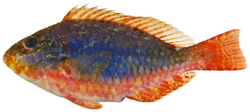Biology:Sparisoma aurofrenatum
| Sparisoma aurofrenatum | |
|---|---|

| |
| Female specimen, initial colour phase | |
| Scientific classification | |
| Domain: | Eukaryota |
| Kingdom: | Animalia |
| Phylum: | Chordata |
| Class: | Actinopterygii |
| Order: | Labriformes |
| Family: | Scaridae |
| Genus: | Sparisoma |
| Species: | S. aurofrenatum
|
| Binomial name | |
| Sparisoma aurofrenatum (Valenciennes, 1840)
| |
| Synonyms[2] | |
| |
Sparisoma aurofrenatum (common names: redband parrotfish, gutong, rainbow parrot, black parrot, and blisterside)[1] is a species of parrotfish native to the Caribbean Sea and Western Atlantic Ocean.[3]
Description
This species grows to 28 cm.
Initial phase
During the initial phase, the colouration varies greatly from blue-green to green to solid olive. The fins are mottled brown to red and have two white stripes. Behind the dorsal fin, a white spot is present.[4]
Juvenile phase
The body of juvenile specimens are shades of red-brown. Normally, two white stripes will be visible with a black blotch present behind the upper gill covers. A white spot will also be present behind the dorsal fin.
During both the juvenile and initial phases, colouration and markings can change quickly.[4]
Terminal phase
The body becomes greenish during the terminal phase. The underside will appear lighter and the anal fin becomes reddish. The tail becomes more square-shaped with black outer tips. The upper portion of the forebody will display a small, yellow blotch with at least two small black dots.
Normally, an orangish-pink[5] colour band will be present starting from below the eye along to the corner of the mouth. A white spot will appear behind the dorsal fin.[4]
Distribution
This species occurs throughout the Caribbean Sea, and the western Atlantic Ocean in the waters of Bermuda, Florida, the Bahamas to Central America and Brazil .[2]
Habitat
Sparisoma aurofrenatum lives on reefs in depths of 2 to 20 metres.[2] The juveniles live among seagrass beds.[6]
Behaviour
Sparisoma aurofrenatum is solitary or found in small groups. It may found resting on the bottom. It is a protogynous hermaphrodite.[2]
While swimming about reefs, this fish will use only its pectoral fins. Only when requiring a sudden burst of speed will it use its tail.[4]
Specimens may be seen defecating frequently, which appears as a white cloud as it is mostly composed of coral limestone.[4]
Diet
Sparisoma aurofrenatum is a herbivore, feeding on algae and polyps it scrapes from rocks and coral using its 'beak'.[7]
References
- ↑ 1.0 1.1 Rocha, L.A.; Choat, J.H.; Clements, K.D.; Russell, B.; Myers, R.; Lazuardi, M.E.; Muljadi, A.; Pardede, S. et al. (2012). "Sparisoma aurofrenatum". IUCN Red List of Threatened Species 2012: e.T190729A17780851. doi:10.2305/IUCN.UK.2012.RLTS.T190729A17780851.en. https://www.iucnredlist.org/species/190729/17780851. Retrieved 19 November 2021.
- ↑ 2.0 2.1 2.2 2.3 Froese, Rainer and Pauly, Daniel, eds. (2019). "Sparisoma aurofrenatum" in FishBase. December 2019 version.
- ↑ "WoRMS - World Register of Marine Species - Sparisoma aurofrenatum (Valenciennes, 1840)". Marinespecies.org. 2008-01-15. http://www.marinespecies.org/aphia.php?p=taxdetails&id=273772.
- ↑ 4.0 4.1 4.2 4.3 4.4 "Marine Species Identification Portal : Redband parrotfish - Sparisoma aurofrenatum". Species-identification.org. http://species-identification.org/species.php?species_group=caribbean_diving_guide&id=252.
- ↑ "Sparisoma aurofrenatum - Redband parrotfish". Aquafind.com. http://aquafind.com/SaltwaterSpecies/Sparisoma_aurofrenatum.php.
- ↑ "View Sparisoma aurofrenatum". Saltcorner.com. http://www.saltcorner.com/AquariumLibrary/browsespecies.php?CritterID=1414.
- ↑ "Smithsonian Tropical Research Institute-Sparisoma aurofrenatum". Biogeodb.stri.si.edu. http://biogeodb.stri.si.edu/bocas_database/search/species/1360.
External links
- Photos of Sparisoma aurofrenatum on Sealife Collection
Wikidata ☰ Q3752243 entry
 |


